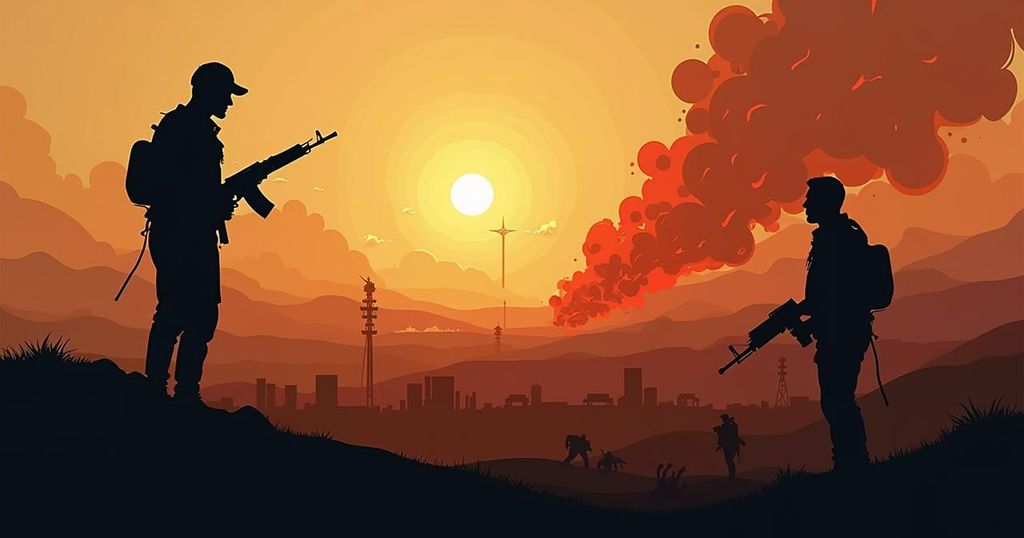Iran is facing strategic challenges following Israel’s claims of eliminating Hezbollah’s leader, Hassan Nasrallah, and Hamas’ operative Ahmed Muhammad Fahd. Supreme Leader Ayatollah Ali Khamenei’s options for retaliation are limited, as regional expert Hamidreza Azizi emphasizes the difficulties in Iran’s next moves without escalating tensions into outright war. Tehran’s proxy network suffers from a lack of command following Nasrallah’s death, and diplomatic resolutions seem unlikely as violence in Gaza and Lebanon persists.
Iran is currently navigating treacherous geopolitical waters following the reported deaths of key figures in Hezbollah and Hamas, notably Hassan Nasrallah and Ahmed Muhammad Fahd. After Israel’s claim of eliminating Nasrallah in an airstrike in Dahiyeh, a regional expert indicates that Iran may find itself with limited options for retaliation. Khamenei has reaffirmed support for Hezbollah, yet the Iranian regime faces difficult strategic decisions. The Israeli Defense Forces (IDF) confirmed Nasrallah’s demise shortly after they announced the killing of Fahd in southern Syria. Nasrallah had been a pivotal leader of the Axis of Resistance, a coalition projecting Iranian influence across the Middle East. Tehran’s response is complicated by the ongoing conflict in Gaza, which began after Hamas attacked Israel on October 7, 2023. Nasrallah had backed Hezbollah’s aggressive stance against Israel, resulting in significant military engagements that forced evacuations in northern Israel. The Iranian leadership’s options appear constrained, as further retaliation could escalate tensions into a larger conflict. Hamidreza Azizi, an expert from the German Institute for International and Security Affairs, noted that Iran’s strategies are limited. “The equation that Iran was thinking about showing a decisive response… seems not to be available anymore after what has happened to Hezbollah,” he stated, highlighting the precarious situation in the region. Iran’s history of making retaliatory threats complicates its current position. Attempts to avenge past perceived insults or attacks, such as the assault on its consulate in Damascus or the killing of Hamas leader Ismail Haniyeh, have not deterred Israeli operations. For Iran, any aggressive move risks triggering a full-scale war, a scenario it appears reluctant to pursue. While Tehran may consider activating its proxy networks in conflicts across the region, the death of Nasrallah has left a notable gap in leadership and command of these groups. The prospects of waiting for a diplomatic resolution also seem dim as fighting in Gaza and Lebanon shows no signs of abating. Ultimately, Iran stands at a crossroads, possessing only poor choices that could lead to dire ramifications for its strategic interests and influence.
Iran’s geopolitical standing in the Middle East is intricately tied to its collaborations with various militant groups, including Hezbollah and Hamas. Following significant escalations in violence, such as the recent airstrikes on these groups’ leaders, Tehran must tread carefully to maintain its influence yet avoid direct military confrontation with Israel. The Axis of Resistance, which encompasses these factions, serves as a crucial extension of Iranian power within the region, complicating any decisions regarding retaliation or military engagement.
In summary, Iran faces a challenging dilemma following recent escalations with Israel and the deaths of influential leaders in Hezbollah and Hamas. The country’s path forward appears fraught with risks, as options for effective retaliation remain limited. As regional dynamics shift and the potential for further conflict looms, Tehran’s decisions will profoundly impact its strategic positioning and the broader Middle East landscape.
Original Source: www.newsweek.com







